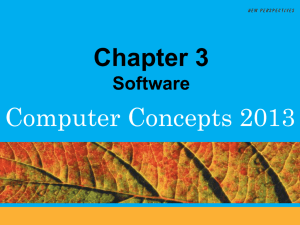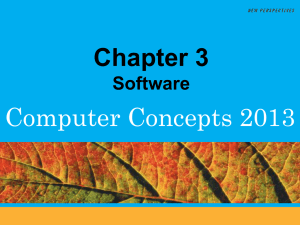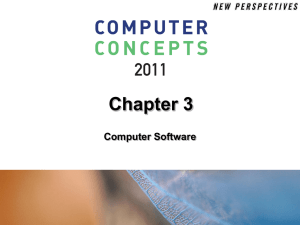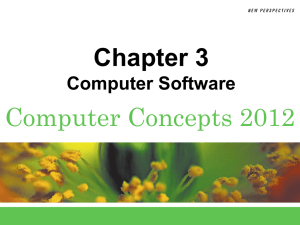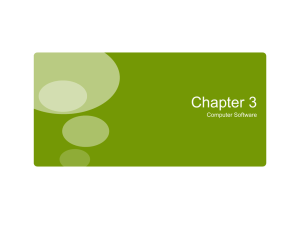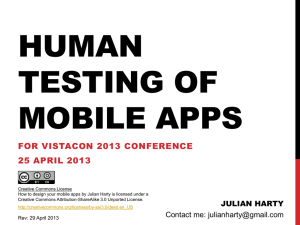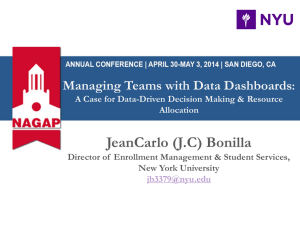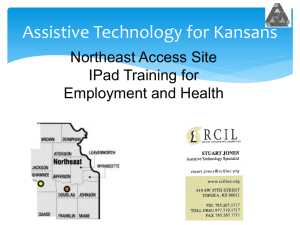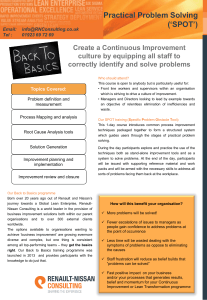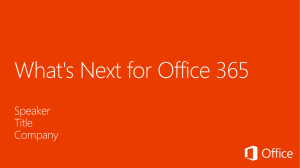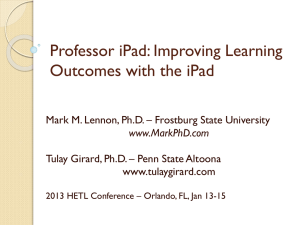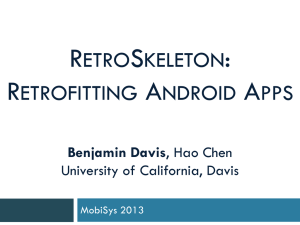Chapter 3 - James Dang
advertisement
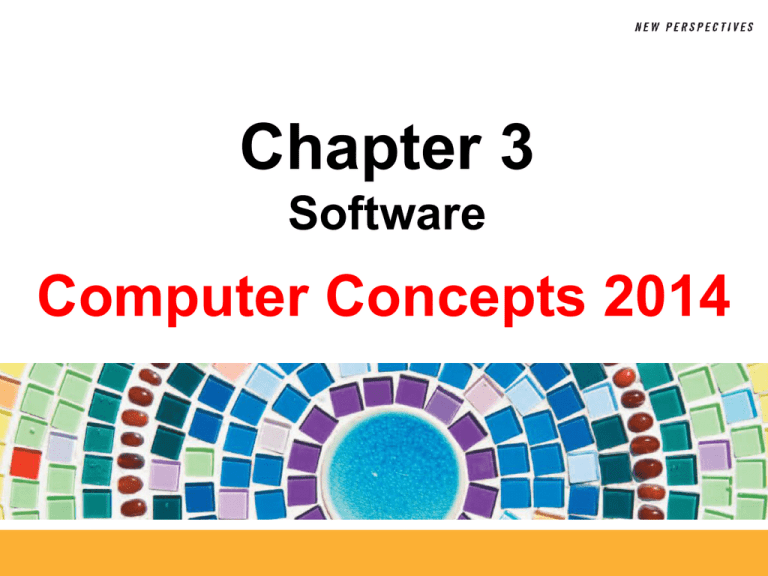
Chapter 3 Software Computer Concepts 2014 3 Chapter Contents Section A: Software Basics Section B: Office Suites Section C: Installing Software and Upgrades Section D: Buying Software Section E: Security Software Chapter 3: Software 2 3 FastPoll True/False Questions Answer A for True and B for False 030100 The two main categories of software are application software and system software. 030200 Location-based software can pinpoint its location by using the device’s built-in GPS or by triangulating the distance from nearby cell towers. 030300 Screen readers are an example of adaptive utility software. 030400 The software you install to help a printer communicate with a computer is called a device driver. 030500 Spreadsheet software is particularly useful for what-if analyses. Chapter 3: Software 3 3 FastPoll True/False Questions Answer A for True and B for False 030600 Database software stores information in HTML codes. 030700 Web apps typically are installed on your computer’s local hard disk. 030800 Downloaded software is usually zipped to decrease download time. 030900 If the main screen of a software product does not contain a copyright notice, it is legal to make copies and share them with your friends. 031000 A EULA is a license agreement that specifies how to legally use a software product. Chapter 3: Software 4 3 FastPoll True/False Questions Answer A for True and B for False 031100 Open source software is public domain. 031200 A software worm can replicate itself. 031300 Botnets offer effective security protection from spyware. 031400 To keep your antivirus software up to date, it is important to get updates of the rootkit. Chapter 3: Software 5 3 Section A: Software Basics Software Categories Music Software Video Software Graphics Software Mapping and Location-based Software Chapter 3: Software 6 3 Section A: Software Basics Business and “Number Crunching” Software Desktop Publishing Software Personal Finance Software Utility Software Device Drivers Chapter 3: Software 7 3 Question 032100 Software publishers offer a huge variety of products for personal computer owners. From which of the following categories does the typical computer owner purchase add-on software? A. System software and operating systems B. Application software and utilities C. Device drivers and application software D. System software and antivirus software Chapter 3: Software 8 3 Software Categories Software is categorized in two main categories: System software Designed for computer-centric tasks Application software Designed to help people accomplish real-world tasks Chapter 3: Software 9 3 Music Software Offers many ways to work with music, sound effects, and narration from your desktop, laptop, or handheld computer iTunes Audio editing software Chapter 3: Software 10 3 Video Software Provides a set of tools for creating video productions from raw footage Consumer-level video editing software Windows Movie Maker Apple iMovie DVD authoring software Chapter 3: Software 11 3 Graphics Software Designed to help you create, manipulate, and print graphics Paint software Photo editing software Drawing software 3-D graphics software CAD software Chapter 3: Software 12 3 Mapping and Location-Based Software A mapping application typically displays satellite, aerial, or street maps used to locate places and get directions between two addresses Google Maps Location-based software is able to access your current location and use it to show you the closest shops, restaurants, and theaters, as well as information about each location Stay alert for devices and software applications that track your location Chapter 3: Software 13 3 Mapping and Location-Based Software Chapter 3: Software 14 3 Business and “Number Crunching” Software Vertical market software is designed to automate specialized tasks in a specific market or business Horizontal market software is generic software that just about any kind of business can use Payroll software Accounting software Project management software Chapter 3: Software 15 3 Business and “Number Crunching” Software Businesses use a variety of “number crunching” software applications for planning and analysis Statistical software Mathematical modeling software Chapter 3: Software 16 3 Desktop Publishing Software Desktop publishing software (DTP software) takes word processing to the next level by providing professional tools for producing typesetquality documents DTP software is available in consumer-level and professional-level versions DTP software allows you to create a page using multiple frames; some frames can hold text, while other frames can hold titles, graphics, and tables Today’s word processing software typically provides an adequate feature set for the document production needs of most individuals Chapter 3: Software 17 3 Desktop Publishing Software Chapter 3: Software 18 3 Personal Finance Software Money management software offers a variety of tools for tracking cash flow and investments Personal finance software, such as Intuit Quicken, is designed to keep track of income, expenses, assets, and liabilities using a simple checkbook-like user interface Tax preparation software is a specialized type of personal finance software designed to help you gather your annual income and expense data, identify deductions, and calculate tax payments Chapter 3: Software 19 3 Personal Finance Software Chapter 3: Software 20 3 Utility Software Utility software is designed to help you monitor and configure settings for your digital gear, its operating system, or application software Third-party software companies offer additional products that extend and improve upon those supplied by the operating system A PDF reader, such as Adobe Reader, is an essential utility that displays documents stored in standard PDF files Chapter 3: Software 21 3 Utility Software Adaptive utilities alter a device’s user interface to create an accessible environment by providing closed captions, text-tospeech, speech-to-text, or large screen text System utilities can track down and fix disk errors, repair corrupted files, and give your device a performanceenhancing tune-up Chapter 3: Software 22 3 Device Drivers A device driver is software that helps a peripheral device establish communication with a computer On a Mac, you can click the Apple icon, select About this Mac, and then select More info to look at a list of devices connected to your computer On a PC, if you need to update a device driver or change its settings, you can usually view driver information by accessing the Control Panel and selecting System (or System and Security) Chapter 3: Software 23 3 Device Drivers Chapter 3: Software 24 3 Section B: Office Suites Office Suite Basics Word Processing Spreadsheets Databases Presentations Chapter 3: Software 25 3 Question 032200 Just about everyone has used iTunes software to download music. iTunes software also allows you to list the songs you’ve downloaded, delete songs, find songs, and organize your music into play lists. These features of iTunes are similar to what type of software? A. Word processing software B. Spreadsheet software C. Database software D. Groupware Chapter 3: Software 26 3 Office Suite Basics An office suite is a collection of programs that typically include word processing, spreadsheet, presentation, and database modules Chapter 3: Software 27 3 Word Processing Word processing software has replaced typewriters for producing many types of documents, including reports, letters, memos, papers, and book manuscripts A typical word processor window displays a work area, called a workspace, that represents a blank piece of paper Chapter 3: Software 28 3 Word Processing Chapter 3: Software 29 3 Word Processing Word processing features include: Word wrap Search and Replace Thesaurus Grammar checker Readability formula Spelling checker Spelling dictionary Chapter 3: Software 30 3 Word Processing Chapter 3: Software 31 3 Word Processing The final format of your document depends on several formatting factors, such as page layout, paragraph style, and font Page layout refers to the physical position of each element on a page Paragraph style includes the alignment of text within the margins and the space between each line of text A font is a set of letters that share a unified design Chapter 3: Software 32 3 Word Processing Chapter 3: Software 33 3 Spreadsheets A spreadsheet uses rows and columns of numbers to create a model or representation of a real solution Spreadsheet software, such as Microsoft Excel, iWork Numbers, Google Docs Spreadsheets, or LibreOffice Calc, provides tools to create electronic spreadsheets Chapter 3: Software 34 3 Spreadsheets A formula tells the computer how to use the contents of cells in calculations Cell references Relative reference Absolute reference Mathematical operators Functions Automatic recalculations Chapter 3: Software 35 3 Spreadsheets Chapter 3: Software 36 3 Spreadsheets Chapter 3: Software 37 3 Databases A database is a collection of data Database software helps you enter, find, organize, update, and report information stored in a database Chapter 3: Software 38 3 Databases Chapter 3: Software 39 3 Databases A query language such as SQL (Structured Query Language) provides a set of commands for locating and manipulating data Natural language query Keyword search Query by example Chapter 3: Software 40 3 Presentations Presentation software supplies the tools for combining text, photos, clip art, graphs, animations, and sound into a series of electronic slides that can be shown on a computer screen or projector Chapter 3: Software 41 3 Presentations Chapter 3: Software 42 3 Section C: Installing Software and Upgrades Web Apps Mobile Apps Local Applications Portable Software Software Upgrades and Updates Uninstalling Software Chapter 3: Software 43 3 Question 032300 Suppose that you’re looking for software to convert a YouTube video into a format you can use with Windows Media Player or iMovie. You don’t want to bother downloading or installing any software on your computer. What should you look for? A. A Web app B. Open source software C. A .zip file D. A portable app Chapter 3: Software 44 3 Web Apps Software installation is a process that places a program into a computer so that it can be run or executed A Web application, or Web App, is software that is accessed with a Web browser Example of cloud computing Many are associated with consumer sites Most require no installation at all on your local computer or handheld device Chapter 3: Software 45 3 Web Apps Chapter 3: Software 46 3 Mobile Apps A mobile app is designed for a handheld device, such as a smartphone, tablet computer, or enhanced media player Most handheld devices can use both Web apps and mobile apps Mobile apps can be purchased from an app store Apple App Store Android Market Apps are available from other sources, but using them requires an unauthorized change to the device’s software called a jailbreak Chapter 3: Software 47 3 Mobile Apps Chapter 3: Software 48 3 Local Applications Most local applications contain a setup program that guides you through the installation process At least one of the files included in a software package is an executable file designed to be started by users or automatically launched by the operating system Chapter 3: Software 49 3 Local Applications Chapter 3: Software 50 3 Local Applications Chapter 3: Software 51 3 Local Applications Chapter 3: Software 52 3 Portable Software Portable software is designed to run from removable storage, such as a CD or USB flash drive Installation is simply a matter of getting program files to the media on which they are supposed to run Chapter 3: Software 53 3 Portable Software Chapter 3: Software 54 3 Software Upgrades and Updates Periodically, software publishers replace older versions of a software product with a new version that’s sometimes referred to as a software upgrade A software update is a small section of program code that replaces part of the software you currently have installed Service packs Chapter 3: Software 55 3 Software Upgrades and Updates Many software applications allow you to set your preferences for how you would like to receive notifications and updates It is always a good idea to install updates and service packs when they become available Chapter 3: Software 56 3 Uninstalling Software Uninstall routines delete the software’s files from the various folders on your computer’s hard disk Chapter 3: Software 57 3 Section D: Buying Software Consumer Basics Software Copyrights and Licenses Chapter 3: Software 58 3 Question 032400 Suppose you purchase a new computer and it comes with Microsoft Office installed. After using this software for 30 days, it displays a message indicating that to keep using it, you will have to pay. This software is an example of all of the following EXCEPT: A. Proprietary software B. Open source software C. Commercial software D. Demoware Chapter 3: Software 59 3 Consumer Basics Most operating systems include a handful of small applications and a good variety of useful utility software Chapter 3: Software 60 3 Consumer Basics System requirements specify the operating system and minimum hardware capacities necessary for a software product to work correctly Chapter 3: Software 61 3 Software Copyrights and Licenses A copyright is a form of legal protection that grants the author of an original work exclusive rights Copyright notice Software licenses, also called license agreements, define the ways in which you may use a computer program Single-user license Site license Multiple-user Shrink-wrap license Chapter 3: Software 62 3 Software Copyrights and Licenses EULA (End-User License Agreement) Different types of software licenses Public domain Proprietary Commercial software Demoware Shareware Open source BSD GPL Chapter 3: Software 63 3 Software Copyrights and Licenses Chapter 3: Software 64 3 Software Copyrights and Licenses Freeware is copyrighted software that is available for free Product activation is a means of protecting software from illegal copying by requiring users to enter a product key or activation code before the software can be used A hash value is a unique number derived from encoding one or more data sets, such as names, serial numbers, and validation codes Chapter 3: Software 65 3 Section E: Security Software Security Software Basics Security Suites Antivirus Modules Chapter 3: Software 66 3 Question 032500 Let’s assume that you have antivirus software installed on your computer and it is up to date. You can trust it to do a pretty good job of protecting your computer from viruses and: A. Bots, worms, Trojans, keyloggers, and rootkits B. RATs, spoofs, and defective Web apps C. Operating system security holes D. Fake e-commerce sites Chapter 3: Software 67 3 Security Software Basics Security software is designed to protect computers from various forms of destructive software and unauthorized intrusions The terms malicious software and malware refer to any computer program designed to surreptitiously enter a computer, gain unauthorized access to data, or disrupt normal processing operations Chapter 3: Software 68 3 Security Software Basics Computer virus Computer worm Mass-mailing worm Trojan horse Remote Access Trojan (RAT) Bot Spider Botnet Spyware Chapter 3: Software 69 3 Security Software Basics Chapter 3: Software 70 3 Security Software Basics Chapter 3: Software 71 3 Security Software Basics The term rootkit refers to software tools used to conceal malware and backdoors that have been installed on a victim’s computer A virus hoax usually arrives as an email message containing dire warnings about a supposedly new virus on the loose Chapter 3: Software 72 3 Security Suites A security suite integrates several security modules to protect against the most common types of malware, unauthorized access, and spam A security suite costs less than purchasing standalone security modules Chapter 3: Software 73 3 Security Suites Chapter 3: Software 74 3 Antivirus Modules Antivirus software is a type of utility software that looks for and eradicates viruses, Trojan horses, worms, and bots A virus signature is a section of program code, such as a unique series of instructions, that can be used to identify a known malicious program, much as a fingerprint is used to identify an individual Virus signatures and other information that antivirus software uses to identify and eradicate malware is stored in one or more files usually referred to as virus definitions Chapter 3: Software 75 3 Antivirus Modules Most experts recommend that you configure your antivirus software to periodically scan all the files on your computer If, during the scanning process, your virus protection software identifies a virus, worm, Trojan horse, or bot in a file or attachment, it can try to remove the infection, put the file into quarantine, or simply delete the file Chapter 3: Software 76 3 What Do You Think? 033100 Do you believe that software piracy is a serious issue? A. Yes B. No C. Not sure 033200 Do you know of any instances of software piracy? A. Yes B. No C. Not sure 033300 Do you think that most software pirates understand that they are doing something illegal? A. Yes B. No C. Not sure 033400 Should software publishers try to adjust software pricing for local markets? A. Yes Chapter 3: Software B. No C. Not sure 77 Chapter 3 Complete Computer Concepts 2014
